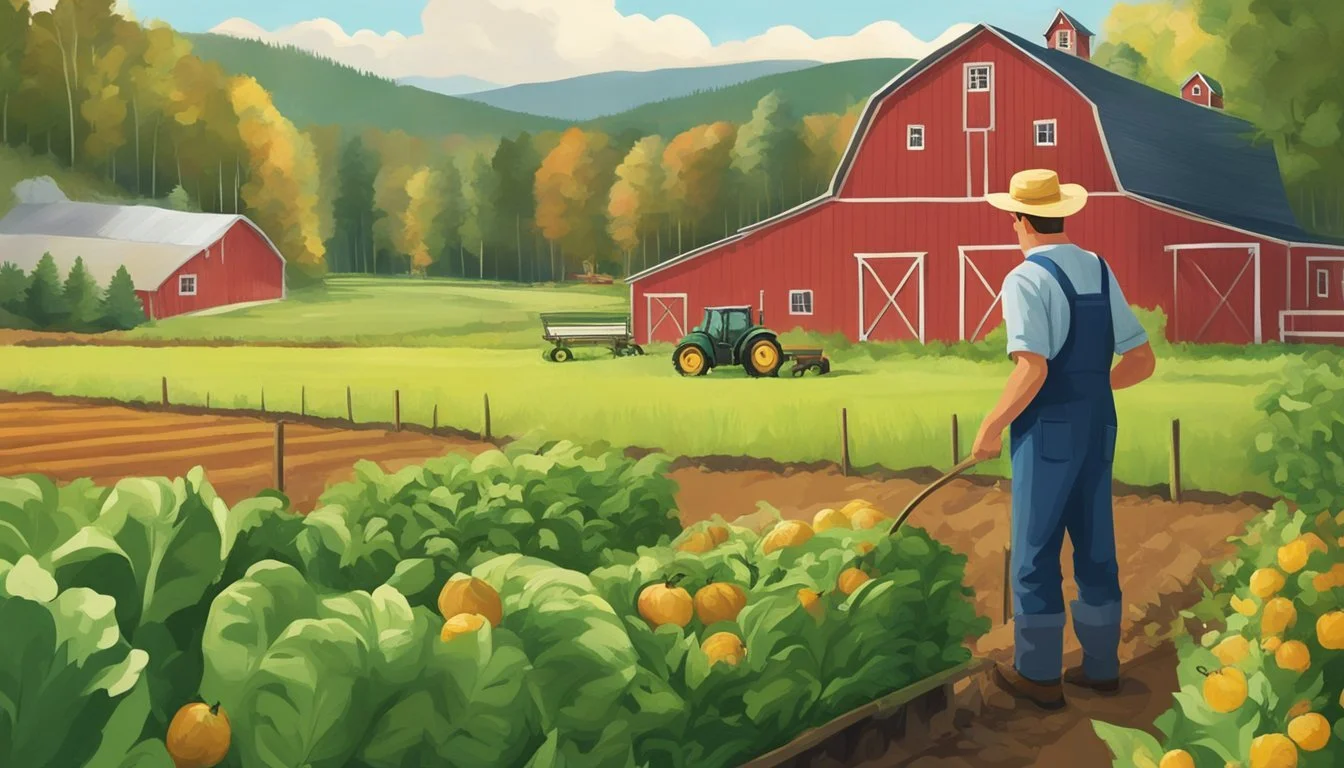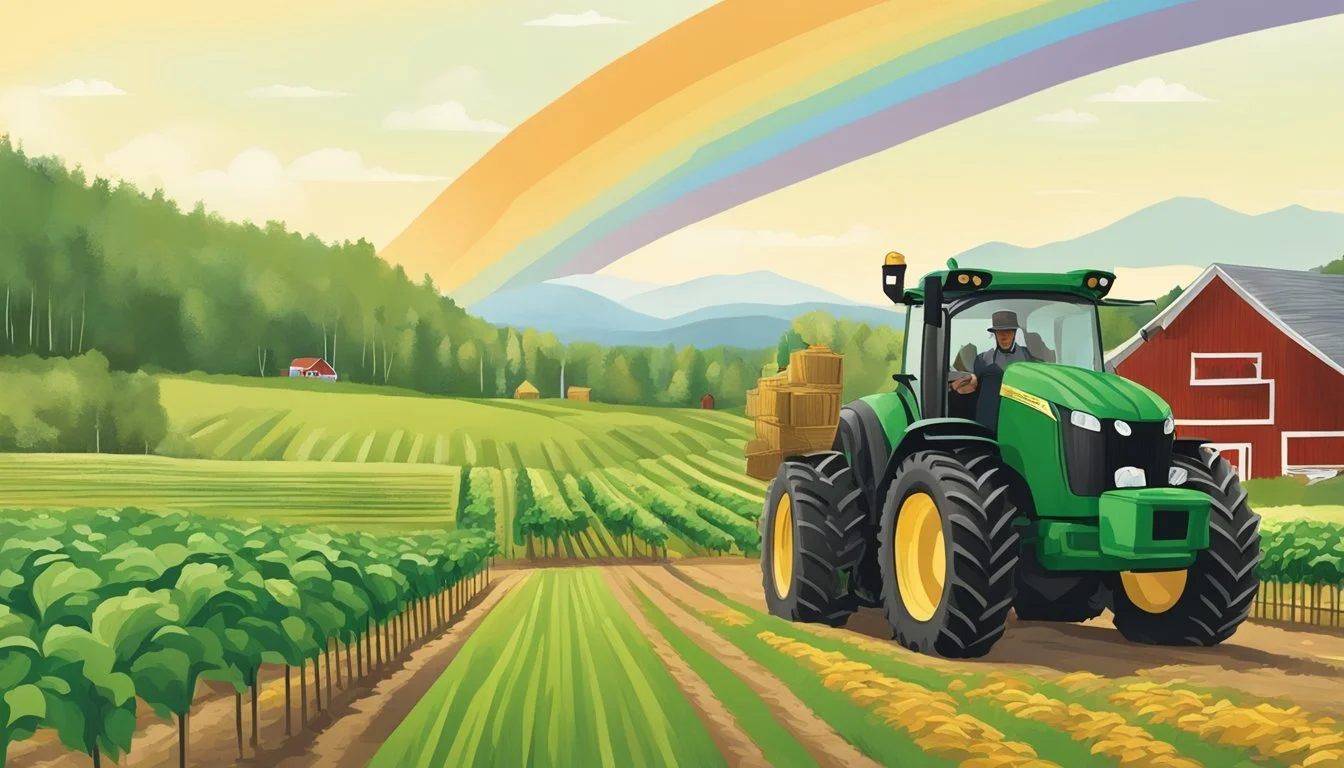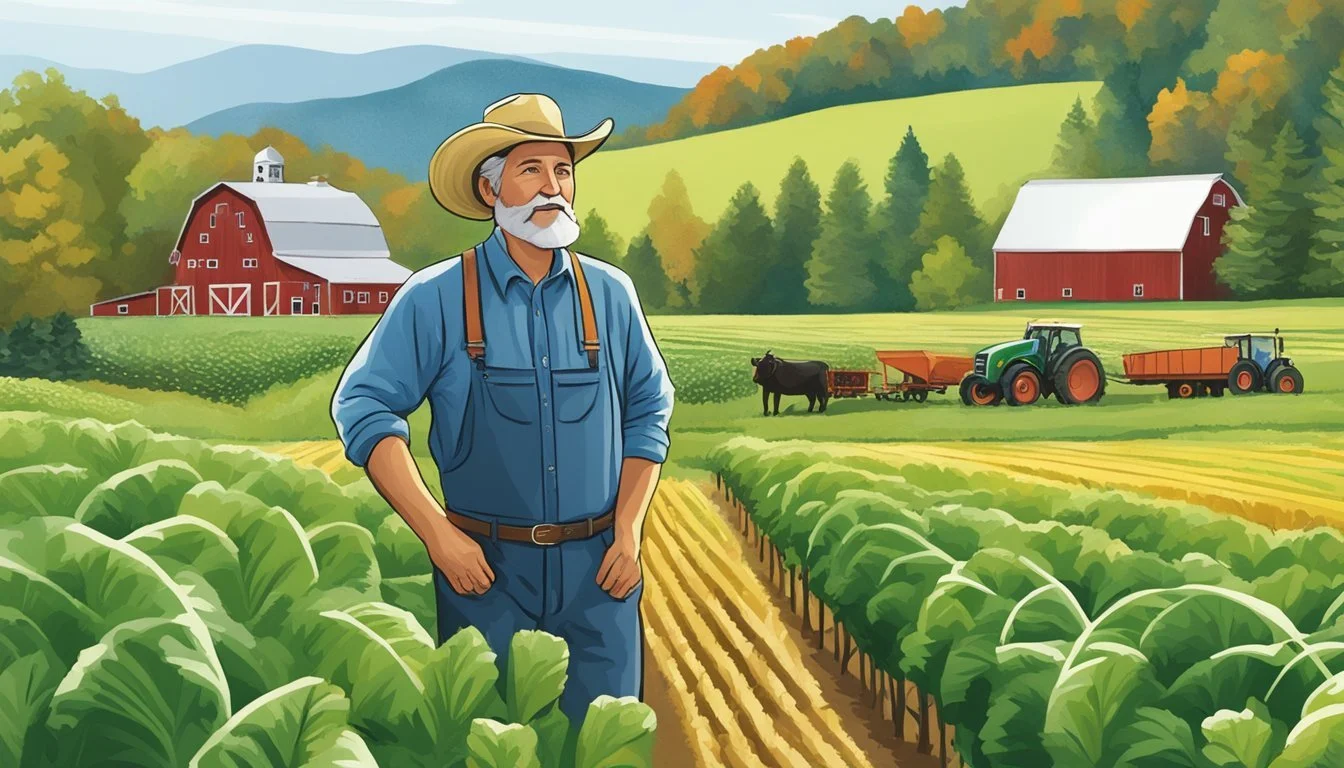Farming Grants Vermont
Navigating Opportunities for Agricultural Funding
Vermont offers a range of funding opportunities for local and regional partners, including agricultural producers and value-added processors. Through various grant programs and financial assistance, the state aims to support farms in improving water quality and enhancing sustainable agricultural practices. These initiatives are geared toward small and mid-sized agricultural businesses within the meat, produce, and maple industries, reflecting Vermont's commitment to bolstering its agricultural sector and supporting local economies.
The Agency of Agriculture, Food & Markets plays a key role in facilitating these funding opportunities, providing resources and a calendar of upcoming grants to assist Vermont's agricultural community. With initiatives like the Agricultural Clean Water Initiative Program and the Vermont Growth Farmer Awards (VGFA) Mini Grants, the state actively invests in on-farm research and development projects led by farmers themselves. These efforts indicate Vermont's dedication to the promotion of innovation and community-led improvement within its diverse agricultural landscape.
Vermont's agricultural grants are a testament to the state's strategy for fostering a future-proof and environmentally conscious agricultural environment. Such financial support allows Vermont to maintain its agricultural heritage while encouraging modernization and economic growth within the agricultural sector. As these opportunities continue to evolve, they serve as a crucial component in the state's overarching vision for a resilient and thriving agricultural community.
Understanding Farming Grants in Vermont
Vermont offers a range of agricultural grants aimed at supporting farms and improving statewide initiatives such as water quality. These grants emphasize the importance of technical assistance, research, and sustainable development.
Overview of Vermont Grants
The Vermont Agency of Agriculture, Food & Markets administers various grant programs designed to aid local and regional partners in agriculture. These programs focus on both broad and targeted areas of farming needs, from enhancing product quality to addressing environmental concerns. Particularly, the Agricultural Clean Water Initiative Program stands out for its dedication to work with farms to improve water quality across the state.
Eligibility Requirements for Farmers
Eligibility for Vermont farming grants typically requires applicants to be engaged actively in farming or agricultural-related processes. Criteria might include the size of the operation and the type of products being produced, such as meat, produce, and maple. Prospective grantees are encouraged to seek technical assistance for guidance on their eligibility and for support throughout the application process.
Funding Opportunities
Funding opportunities in Vermont range from small grants to more substantial financial assistance programs. Here, initiatives such as the VGFA Mini Grants support on-farm research, aiding farmers to innovate and trial new agricultural practices. These grants vary in size, with some offering between $500-$1,000 to support specific research led and designed by farmers. To fully capitalize on these opportunities, stakeholders can consult the Funding Opportunity Calendar, which provides detailed information on upcoming and year-round programs.
Grant Application Process
The grant application process in Vermont is an organized sequence of steps that applicants must carefully navigate to secure funding for agricultural projects. It involves locating the appropriate grants, preparing the application with attention to detail, and following through with submission and post-submission requirements.
Finding Grants
Prospective applicants should start by identifying funding opportunities using the Agency of Agriculture Food and Markets' resources. The agency's website hosts a Funding Opportunity Calendar which lists all available grants by date. Individuals can utilize the Vermont WebGrants system, an online platform where the state lists grant opportunities and applicants can manage their grant applications.
Key Action Steps:
Visit the Agency of Agriculture Food and Markets website.
Refer to the Funding Opportunity Calendar.
Access the Vermont WebGrants system.
Preparing Your Application
Once an appropriate grant is identified, applicants are advised to thoroughly read the Request for Applications (RFA) to understand the eligibility criteria, funding scope, and application process specific to the grant of interest. The next step is to compile the required information, which may include a thorough description of the project, budget details, and any supporting documents.
Requirements:
Read the full RFA closely.
Gather all necessary documentation and data.
Submission and Follow-Up
After preparing the application, the next phase is to create an account or log into an existing account on the Vermont WebGrants system to submit the application electronically. Following the submission, keeping track of the application status and being responsive to any communications from the grant agency is crucial. This ensures that any requests for additional information or clarifications can be addressed promptly.
Critical Steps:
Register for an account or sign in on Vermont WebGrants.
Electronically submit the application before the deadline.
Monitor the application status and engage with the funding agency as needed.
Types of Farming Grants
Vermont offers a diversity of farming grants tailored to strengthen agricultural practices across equipment procurement, dairy farms, land conservation, organic farming, and more. These grants aim at encouraging innovation, promoting sustainability, and supporting the transition of working lands.
Federal and State Programs
State and federal bodies provide grants such as the Environmental Quality Incentives Program (EQIP) and the Conservation Stewardship Program (CSP) to support sustainable practices. They offer financial assistance to farmers for implementing conservation techniques and to foster environmental quality on agricultural lands.
Working Lands Initiatives
The Working Lands Enterprise Initiative focuses on invigorating Vermont's agricultural economy. It provides grants to support businesses in areas such as equipment purchasing, marketing, and processing. This fosters an environment where agricultural entities can thrive and grow.
Dairy and Livestock Grants
Programs like the Dairy Cohort Technical Assistance Contract provide grants specifically for dairy farmers. These grants facilitate technical assistance and address issues unique to dairy production, including the procurement of modern equipment and adoption of innovative practices.
Crop and Plantation Grants
These grants typically offer financial support for crop development and expansion of plantations. With an emphasis on sustainable practices, the grants may cover the transition to organic farming, helping to reduce chemical usage and improve soil health.
Conservation and Environmental Grants
Aiming to enhance Vermont's natural landscapes, these grants support efforts to reduce sediment runoff and improve water quality. Initiatives such as the Conservation Reserve Enhancement Program assist farmers in removing land from agricultural production to establish vegetative buffers.
Research and Development Grants
Vermont empowers agricultural research through grants that enable farmers and cooperatives to improve their operations. The Vermont Employment Growth Incentive helps by funding eligible research and development projects that lead to employment growth and agricultural innovation.
New Farmer and Transition Grants
Support for new farmers and those looking to transition to more sustainable practices is available through various programs. These grants help with costs associated with new ventures and shifts to organic or conservation-focused farming methodologies.
Financial Resources Beyond Grants
In Vermont, farmers have access to a variety of financial resources other than grants to ensure the stability and growth of their agricultural enterprises. These tools serve as a safety net and support mechanism for farm-related activities.
Loans and Credit Options
Farmers in Vermont can explore several loan and credit options tailored to agricultural needs. The USDA Farm Service Agency (FSA) offers Microloans, which are operating loans designed to meet the needs of small and beginning farmers, as well as specialty crop and niche operations. These loans feature streamlined paperwork and eased requirements. Another resource is the Vermont Farm Fund, which provides no-hassle, friendly-term loans to local farmers and food producers.
Insurance Programs
To mitigate risks associated with unpredictable farming conditions, farmers may consider federal crop insurance programs. These insurance programs provide financial assistance to cover crop losses due to natural disasters or significant fluctuations in commodity prices. They are a critical component in safeguarding a farmer's livelihood.
Rural Development Programs
The USDA's Rural Development initiatives foster growth and improvement in rural areas. These programs offer grants, loans, loan guarantees, and technical assistance. They help agricultural producers and cooperatives improve their operations' effectiveness and efficiency. Additionally, Vermont's agricultural community may benefit from programs like revolving loan funds, which are designed to recycle loan repayments to provide ongoing support to multiple projects over time.
Maximizing Farm Potential
The transition to sustainable practices and enhancement of business operations in Vermont's farming community rely on effective guidance and assistance. The available grants are aimed at improving farm viability and preparing for future challenges.
Technical Assistance and Advising
Farming enterprises in Vermont may access specialized technical assistance and business advising to navigate the complexities of modern agriculture. The Dairy Food Safety and Certification Grants are designed to ensure that dairy farms, processors, and related associations receive the support required to enhance product safety.
Risk Management Education Programs
Offer strategies to mitigate risks associated with agricultural production.
Business Enhancement Strategies
Grants for business enhancement strategies focus on equipping small farms with the means to diversify and stay competitive. The Small Farm Diversification & Transition Grant, for instance, provides financial aid between $5,000 and $15,000 without a match requirement, bolstering small-scale farmers' ability to invest in their enterprise's growth.
Grant Utilization
Equipment, workforce development, and marketing efforts.
Sustainability and Energy Projects
Grants targeting sustainability and energy projects encourage farmers in Vermont to incorporate renewable energy systems, reducing reliance on fossil fuels and minimizing the carbon footprint. The Agriculture Development Grants support a broad spectrum of initiatives, including infrastructural improvements for long-term environmental sustainability.
Renewable Energy Systems
Installation of solar panels, wind turbines, or other renewable energy technologies.
Additional Supports for Vermont Farmers
Vermont offers various programs focused on improving and supporting the agricultural sector. These supports aim to assist farmers in education, upgrading infrastructure, and market development.
Educational Programs and Workshops
The state of Vermont recognizes the importance of continuous learning and offers educational programs and workshops for farmers. These programs are tailored to provide training in both production techniques and business management. Farmers can improve their knowledge base and gain new skills that are essential in today's competitive agricultural market. Through these educational avenues, small farm operators gain insights into sustainable practices, enabling them to maintain viability in changing environmental and economic landscapes.
Marketing and Market Development
In an effort to bolster marketing and market development, Vermont provides resources aimed at assisting farmers with accessing new markets and enhancing their marketing strategies. Initiatives like Agriculture Development Grants support value-added processors in the meat, produce, and maple industries. These grants enable small and mid-sized producers to increase their market presence and meet consumer demand. By investing in market development, the state encourages local food systems that are robust and diverse.
Farming Infrastructures and Equipment
Strong infrastructure is the backbone of successful farming operations. Vermont acknowledges this by offering financial assistance for on-farm infrastructure and equipment. Farm sustainability projects, like those that reduce water and power use or improve soil health, can receive financial backing. Through grants like the FruitGuys Community Fund, which provides up to $5,000, farmers can invest in small-scale projects that have significant environmental impacts. Additionally, the state allocates funds for the diversification and transition of small farms, aiding them in adapting to new agricultural challenges and opportunities. This financial support is instrumental in enhancing the state's agricultural productivity and competitiveness.
Grant Management and Compliance
Managing grants involves adherence to specific regulations and requirements that ensure funds are used appropriately. This section unpacks the pivotal elements of grant management and compliance within the sphere of Vermont farming grants.
Best Management Practices
Farmers and agricultural producers are expected to utilize Best Management Practices (BMPs) to maintain and enhance soil health, a priority for any funded project in Vermont. BMPs are critical for grant compliance and can include crop rotation strategies, the use of cover crops, and controlled livestock grazing. Adopting these practices not only supports the sustainability of the farm but also aligns with the criterions set for various funding opportunities.
Monitoring and Reporting
Grant recipients must implement a rigorous Monitoring and Reporting system. Tracking the effectiveness of BMPs and financial expenditures is crucial for accountability. Recipients are typically required to submit periodic reports detailing:
Use of funds
Progress towards goals
Soil health improvements
This reporting enables funders to assess the impact of their investment and helps guide decisions on future funding allocations.
Grant Renewal and Future Funding
The possibility of Grant Renewal and Future Funding is contingent upon a recipient's compliance and performance. Continuation of funding may be available if a recipient can demonstrate that their farming practices have led to tangible improvements in sustainability and productivity. Funders evaluate factors such as enhancements in soil composition and overall ecosystem health. A positive track record can significantly increase the chances of securing subsequent rounds of financial assistance.
Specialized Farming Grants and Opportunities
Vermont offers a myriad of grants aimed at enhancing agriculture through organic practices, diversification, and disaster resilience. These programs are designed to support small and mid-sized farms in their efforts to innovate, overcome challenges, and contribute positively to the state's agriculture sector.
Organic and Sustainable Farming
Vermont's Agency of Agriculture, Food and Markets provides incentives for organic and sustainable farming operations. These grants focus on reducing environmental impact and promoting soil health. Funds may be available to convert conventional farms to organic, implement sustainable water management practices to prevent soil erosion, and reduce chemical use through integrated pest management.
Eligibility: Organic farmers, agricultural producers committed to transitioning to organic
Scope: Water management, soil health, pest control
Diversification and Accessory Businesses
To encourage growth and long-term sustainability, Vermont supports diversification of farm activities and the development of accessory on-farm businesses. Farms can receive assistance to expand into areas such as value-added processing for meat, produce, and maple industries. The aim is to boost income streams and local food systems through innovative approaches.
Eligibility: Small and mid-sized agricultural producers
Funding Goals: Development of value-added processing enterprises, expansion of product lines
Disaster Recovery and Protection
The state acknowledges the critical importance of protecting farms from disasters such as flooding and fire. Funding opportunities are available to help farms develop strategies and infrastructure enhancements that safeguard against such events. This could include building flood defenses, fireproofing structures, or acquiring insurance against crop failures due to extreme weather.
Eligibility: All agricultural producers at risk of natural disasters
Assistance Types: Structural modifications, insurance programs, recovery funds
Community and Agricultural Development
In Vermont, a robust framework of grants fosters strong ties between agriculture and the community. These grants encourage sustainable practices, educational initiatives, and the preservation of historic agricultural structures.
Community-Supported Agriculture
Community-Supported Agriculture (CSA) programs are vital for connecting local farms with their communities. In a CSA, members buy shares of a farm's harvest in advance, providing farmers with upfront capital. Vermont's Agricultural Clean Water Initiative Program offers grants to improve statewide water quality, benefiting both farms and their communities.
Agricultural Education and Outreach
Educational initiatives are essential for the development of Vermont's agricultural community. The Agricultural Management Assistance Program aids farmers in adopting integrated pest management practices which are shared through outreach efforts. Additionally, funds are often allocated to support educational projects that enhance the understanding and skills of both new and established farmers.
Historic Preservation and Cultural Grants
Vermont takes pride in its agricultural heritage, showcased through the Barn Preservation Grant Program. This initiative assists in the restoration of historic agricultural buildings, thus preserving the cultural landscape. The grant not only maintains the aesthetic integrity of Vermont's rural areas but also ensures structural safety and historical accuracy.
Programs like these fortify the message that Vermont values its agrarian roots and is invested in educating its citizens about sustainable agriculture while also protecting its historical infrastructure.
Contact and Support Information
For farmers seeking grants in Vermont, there are dedicated contacts and support services designed to streamline the application process and provide assistance.
Agency and Organization Contacts
Vermont Agency of Agriculture, Food and Markets: This is the primary state agency responsible for agricultural grants. Farmers can inquire about grant opportunities and seek assistance via the following media:
General Inquiries: 802-828-2430
Business Development: 802-828-1619
Media Inquiries: 802-622-4662
Licensing & Registration: 802-828-2436
Website: Vermont Agency of Agriculture
Vermont Land Trust: The trust works to protect and conserve land for agricultural use. For matters related to conservation and potential funding, they can be reached at:
Phone: 802-917-2637
Website: Vermont Land Trust
Local Support Networks
Local Crowd Upper Valley: They offer a platform for community-based crowdfunding that can provide an alternative or supplement to traditional farming grants.
Website: Local Crowd Upper Valley
Hotlines and Help Desks
Assistance is generally available for grant applications and queries on a state and local level. While Vermont does not have a specific agricultural grant hotline, service desks within the state agency and associated organizations are equipped to answer calls during business hours.
For grant-related queries that require immediate attention, farmers can typically leave a message, and the agency will return the call promptly. Verification of the contact number and availability can be done via the Vermont Agency of Agriculture's official contact page or directly with the organization in question.









